The Conference Experience
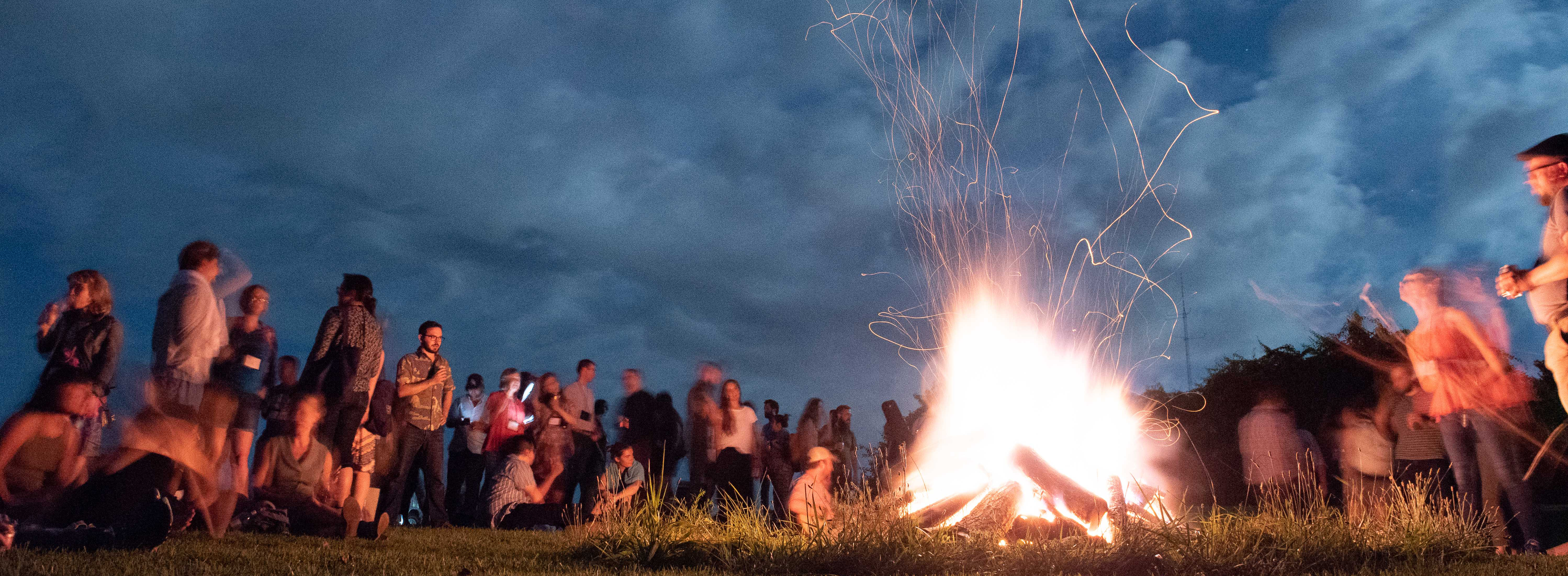
George David Clark
2015 Walter E. Dakin Fellow
One night at Sewanee last summer, a half dozen writers piled into my car with towels and bathing suits. We drove out to the reservoir a mile or so from campus and dove off a little cliff into the water. The crickets were loud and frogs croaked along the shore and it was so dark we couldn’t tell who was who. Of course, I can only recall a fraction of our conversation—poems were recited, jokes told—but I remember it was one of those nights when everything that was said seemed important and true. Even the jokes. At some point it struck me that after a day spent studying poems and stories and plays together, the most natural thing in the world is to put your arm around your friends and try to sing together for a while.
When I first pulled onto campus, my excitement was focused on the beauty of the Mountain, the intimidating excellence of the manuscripts we would be considering in workshop, and the promise of hearing some of my heroes lecture and read. Those attractions certainly didn’t disappoint, but even the readings (where I cried and laughed to the brink of tears) aren’t the first thing I recall when I think of the Conference, or why I recommend it to every writer I know. What makes Sewanee so special is the people Wyatt Prunty gathers there each year, and the atmosphere of fellowship and encouragement and graciousness that he and Megan Roberts and Adam Latham and the rest of the staff have so successfully fostered. Their humility and hospitality are simply infectious.
There’s a feeling you get as you read certain favorite books: it seems authors speak to you directly, and, as their language compels you to respond, you talk back so articulately that you surprise yourself. It’s that feeling that drives us to the blank page and you experience it over and over again at Sewanee. Why shouldn’t you? The men and women you spend your time with there are authors you’ll be reading for the rest of your life, and for 12 days each and every one of you commits to investing in the life and work of the others. Joining the Sewanee community isn’t only a great honor and pleasure; it’s a fellowship that sustains you long after the end of the Conference.
As I recall that night at the reservoir, I have to admit there is too often a deficit in my life of words that are important and true. My sense is that this is the case with everyone, though perhaps writers are especially attuned to the lack. You can’t hear something true just anywhere, but in the two summers I’ve attended the Sewanee Writers’ Conference I’ve found real, generous candor and camaraderie too many times to count.
The Sewanee writers continue to bless me and I will always look forward to the next time we meet.
Rebecca Foust
2015 Walter E. Dakin Fellow
People at Sewanee were warm, friendly, and unpreoccupied with rank and status. Faculty sat with us at meals and attended our readings. The storied Southern hospitality was everywhere, in the feeling of welcome, the delicious regional food, and the kind of meticulous attention to detail that keeps guests happy.
Beyond the shiny credentials, what struck me was the passion and intensity the faculty brought to their readings and craft lectures, and the way these began to cross-pollinate as the week went on. The readings were spectacular, and one given in tribute to Mark Strand and Claudia Emerson moved many to tears. Dan O’Brien’s piece read by Dan and a professional actor playing Dan blew me away, and I think I’ll remember the message of Alice McDermott’s craft talk—“only connect”—for as long as I am writing.
Workshop with Daniel Anderson and Mary Jo Salter sets the standard by which I’ll measure workshops going forward. Ego was not part of the equation, just thorough preparation, close attention, and comments that were honest and constructive but never unkind.
Although the schedule was full, meals felt leisurely and space was left for optional social activities. I loved the lawn parties, barbeque, limerick contests, and Trivia Bowl, but also appreciated feeling free to relax and read.
The setting was gorgeous and Gothic. Sunsets streaked red and gold over the mountains, buildings with crenellations and turrets, and in my dorm, a staircase that mysteriously omitted a door to the fourth (my) floor. Huge old poplars, cicadas louder than any I’ve heard, and a moon more swollen and near than the one at home. Swimming in a small reservoir at night and talking po afterward on the dock. A graveyard on campus. Crepe myrtle and honeysuckle, dinner-plate sized hibiscus—name your expectation for postcard Southern beauty, and Sewanee had it.
What I remember best: one after-dinner conversation with a brilliant and very kind writer who later that night turned up behind the lectern (Christine Schutt). Walking back from readings under a sky thick with stars. Adam Vines’ “Blinky” and Wyatt Prunty’s “Bad Dog.” The last line of Dan Albergotti’s “What I Wanted to Tell Her About Hell” (“Go there”) and the first lines of Maurice Manning’s “Moth” (“I praise God if God is the one / who taught me to read”). The hush after Tim O’Brien finished reading from The Things They Carried. Light pouring down through clerestory windows while Christina Stoddard and Dan Albergotti said their poems to a few of us gathered in the dorm, then Jeff Buckley singing “Hallelujah” and everyone choked up and hugging after that. “Only connect,” Alice McDermott told us, and I did at Sewanee.
Christian Kiefer
2015 Father William Ralston Fellow
Tennessee sucks in the summer. That’s how songwriter Ryan Adams puts it and he’s not lying. The thing is, the boiling alive that happened—days so hot and moist that the manuscript pages we all carried around drooped like damp paper towels—was just part of the whole swirl of experience, a kind of weird magic that descended upon me and, I assume, upon us all. In my dreams, I still sometimes find myself walking through the old cemetery on campus, the big trees towering everywhere with their waxy leaves filtering the sun, and my thoughts are all of words and friendship and the friendship of words.
And what friends did I make! Too many to name, but among those names you might well know: Richard Bausch took me under his generous wing. Adrianne Harun shocked me in letting me know she read my first book. Christine Schutt welcomed me with warmth and humor. Tim O’Brien and I talked the discography of The Band late into the night. Then there was the mind-blowing intellectualism of Alice McDermott and the sheer beauty in the words of Maurice Manning and Sidney Wade. I could go on. I could list them all and many others besides—especially the Richard Bausch/Randall Kenan workshop I was lucky enough to be a part of, a group that took the story I submitted and kicked its guts all over the forest floor—exactly what it needed.
I never wanted to leave and even now I sometimes feel the weird magic pull of the Cumberland Plateau. The final night some core group of us gathered at the French House and blasted out a bunch of old tunes—me on the banjo, and everyone else singing out under a sky awash with stars. The Band’s “The Weight,” some folk tunes, some standards, some sing-along favorites. It doesn’t get any better than that. It never will.
James Arthur
2014 Walter E. Dakin Fellow
Going to the Sewanee Writers’ Conference is one of the best things that I’ve done for my writing. Every day was packed with readings, lectures, and workshops... and even casual conversations over lunch would sometimes open unexpectedly into deep waters. Each night I went to sleep exhausted but happy, feeling that I could not possibly absorb another reading, and yet the next morning I always woke full of excitement about the day ahead. I met people who inspired me, who enlarged my sense of what is possible, and above all, I met writers who became my friends. The Sewanee Writers’ Conference is a place of friendship. 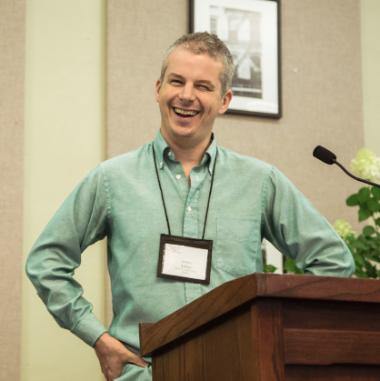
That spirit of amity and shared enterprise carried into the classroom. My workshop instructors, Charles Martin and A.E. Stallings, were brilliant, as I’d expected, and they were also kind. They looked for the strengths in every student’s poem, and at the same time they pushed all of us to work harder and to extend our capabilities as poets. Mary Jo Salter’s craft talk on Shakespeare in the age of artificial intelligence took up the question of what it really means to be a humanist (or a human, for that matter), and Alice McDermott spoke powerfully about how important it is for emerging writers to trust their particular sense of what to write, and of how to write it. So many of the faculty readings were in themselves lessons on the art of writing, and every aspect of the Conference seemed touched by the gentle, gracious presence of Wyatt Prunty. Together with Megan Roberts, Adam Latham, and the rest of
the Conference staff—all of them accomplished artists in their own right—Wyatt welcomed us into an environment where writing matters and the imagination is celebrated.
What do I remember? Staying up till midnight outside the French House, talking with new friends while enjoying Celtic music performances by Patrick Armstrong and Michael Winch; taking advantage of a seemingly endless supply of coffee between hearty meals at the Sewanee Inn; listening to Maurice Manning read poetry at the grave of Allen Tate; walking the grounds of what is surely one of the most lush and picturesque campuses in the country; and, of course, going home with dozens of new books that I will cherish.
Thank you for having me at the Conference. It was a little taste of paradise, and I miss it already.
Pamela Erens
2014 Walter E. Dakin Fellow
I’m not going to write about the lovely starlight swimming at Sewanee, or taking early morning hikes with the staff, or listening to music late into the night at the French House, because other fellows have written beautifully about experiences like that. And because I didn’t do any of those things. I am here to reassure you that even if, like me, you are introverted, don’t particularly care for booze, and need a lot of sleep, you will still have a tremendous time at Sewanee.
Sewanee presents two weeks of nonstop riches, and some of us have to pace ourselves more than others. A typical day might include two readings, a publishing panel, a craft lecture, one’s workshop, a pre-dinner reception, an evening open mic—and then unscheduled socializing (for some) until daybreak. Each morning I took out my schedule and decided on a selection of what was to follow, as if choosing from a delectable tasting menu. (As a fellow, though, I did make sure I hit every fellow reading.) Some of the standouts for me in 2014 were Alice McDermott’s craft talk “Advice to My Younger Self,” Margot Livesey on Virginia Woolf, Steve Yarbrough’s story “Tuscany Now,” B.H. Fairchild’s exploration of what makes poetry alive on the page, and fellow Cheri Magid’s staging of her delightfully risky erotic play The Tavern Wench. I know I missed some other things I might be raving about now.
I alternated nights at the French House with nights in my room reading manuscripts or catching up on email. I made time for quiet. Most of all, I made friends.
The Sewanee Writers’ Conference is a warm and welcoming place, and that warmth and welcome does not end when the Conference does. Although attendees are divided into fellows, scholars, and contributors, Sewaneeans, including staff and faculty, have a robust skepticism about hierarchy. Everyone mixes in the dining hall, while walking between events, and at the receptions. There’s a “we’re all in this crazy business together” vibe—an understanding that whether you’ve published several books or are still waiting for your first short story or poem acceptance, you’re part of a community that believes in the soul-making process of fashioning and refashioning strings of words on paper. In this, we are all equal: all equally passionate and trembling, and always to some extent beginners—whether shy or gregarious ones.
James Scott
2014 Father William Ralston Fellow
How many places make one feel truly, blissfully at home? For me, there is a handful, half a dozen at most. When I first came to the Sewanee Writers’ Conference in 2008, travel-weary and nervous, I walked through the Nashville airport wondering how I would recognize the Conference representatives, but before I even spotted the Sewanee T-shirts, I saw a group and immediately knew that they were my people, and I was theirs. Every lecture, every reading, every workshop, and every late night talking books and life reinforced this feeling. Few things, then, made me as happy as returning to Sewanee this past summer. I felt like I’d come home.
I was so excited about my workshop that I read everyone’s work before getting on the plane, and looked forward to it every morning once I arrived. Workshop leaders Steve Yarbrough and Jill McCorkle set an unspoken precedent that we were there to help and to encourage, and everyone joined in the effort to send writers off with a better understanding of their pages and how to improve them. The energy was wholly positive, which is a rare thing at the often over-critical workshop table. The writing world supplies enough critics, but Sewanee fosters careful readers, friends, and allies. There is no other place like it.
Few spaces have meant more to my writing and reading process than the Cushman Room, where we gathered morning, afternoon, and night to hear brilliant writers and thinkers. From the mobilizing spirit of Alice McDermott’s advice to her younger self to Allen Wier’s gorgeous portrait of the nature of memory, from the hush during Maurice Manning’s poems to the laughter as Wyatt Prunty described a dog running amok during a reading, enough brainpower, passion, and unifying energy flowed through that room to power a thousand new books. I was the first fellow to read, and it’s a good thing, because if time had gone on, the astounding talent of my fellow fellows would have been too intimidating. From the faculty on down, one of the greatest pleasures of Sewanee is knowing that the careful hand that selected and assembled all that genius tapped you on the shoulder as well.
During the long nights or bleak mornings when I stare at a blank page or, worse, a jumbled mess of a full one, the pride of belonging to such a group is enough to make me stay at my desk and have faith that if I work there long enough, I may be able to return home again.
Catherine Staples
2013 Walter E. Dakin Fellow
Much of what we do as writers we do alone, to the tick of our home clocks, guided by writers with whom we mostly keep company on the page. But all of that changes in an instant on the Mountain. At Sewanee, you are in the presence of distinct lyric voices and true storytellers. During readings, I loved glancing down the rows. The alert expressions distilled for me the essence of Sewanee: a readiness to be delighted, surprised, and engaged. Each day, the room felt astir with the previous night’s readings: Tony Earley’s rivals, Jack the giant-killer and Tom Dooley, glared at one another; Jill McCorkle’s tattooed cashier drew us in close. By the final night, A.E. Stallings’ carousel horses seemed to print the air alongside a host of others: a surge of light exploding in the Vietnam night, a grievous betrayal, a porcelain setting egg falling from a hen-house shelf, a backstage diva, an icicle sharp with the end of a marriage, wind on a pond.
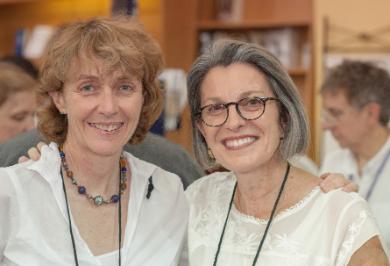
The craft talks were impressive, from Robert Hass and Mary Jo Salter on modernity—with close readings of Gertrude Stein and Marianne Moore—to Wyatt Prunty on mentoring and reciprocity between John Crowe Ransom and Randall Jarrell. Our Hass-Emerson workshop was exceptional; to borrow an expression from Claudia Emerson, we spent time on both the neck of the guitar as well as the song. Instruction was masterful and conversations lively.
Most of the best moments at Sewanee were shared: six of us treading water in the silty, cold currents of the pond, roving in packs through the peeper-singing dark to and from the French House, enjoying a raucous group recitation of Lowell. Swimming at the reservoir was like something out of Auden: the clarity of the dark water, ring of trees, and companionable silence as we swam out for the cattails. But best of all was my manuscript conference in a snug corner on the porch of Stirling’s. Sitting alongside Claudia Emerson, listening to her astute observations, I felt the manuscript’s shape and direction clearing. In some essential way, she readied me for the hard work to come. A friend snapped a photo, and though you’d be hard-pressed to recognize us, it’s witness to an important moment. The mere dream of that meeting led me to Sewanee. I am enormously grateful for the Walter E. Dakin Fellowship and for all the friendships that began there.
Andrew Malan Milward
2013 Walter E. Dakin Fellow
Sewanee ruined my life.
Wait, let me clarify.
Attending the Sewanee Writers’ Conference was one of the most amazing experiences of my life. I feel boundless gratitude for the opportunity. What’s difficult, however, is leaving the Mountain and reencountering how un-Sewanee most of your actual life is. Here’s what I mean:
Like many Americans, I’m an expert at self-diagnosis, and recently, I thumbed through the DSM-5 to find I have a quite common malady some bad-poet-turned-doctor has termed “post-Sewanee melancholy,” or as us afflicted sometimes shorthand when we’re weeping in the fetal position: “PSM!” The symptoms begin with realizing Richard Bausch won’t be there to welcome you home with a song on his guitar, followed by the terrifying knowledge that Christine Schutt isn’t looking over your shoulder as you write, whispering, “It’s all about the sentences. Be absolutely brutal with yourself.” And if you thought perhaps you smuggled Robert Hass into your luggage and believed he was just gonna follow you around dropping wisdom and making you want to be a better citizen of the world, well, then it’s time for the straightjacket, homeboy. And that’s only the beginning. These and countless other epiphanic indignities will be visited upon you in the days after leaving Sewanee, which, if you like me live several states away in an apartment located between a Motel 6 and a cowboy bar, can make the Mountain and your new friends seem many moons away. Jill McCorkle has assured me that what I’ve come to call “my condition” will pass, but who the hell can believe what she says? She’s a fiction writer.
Here’s the thing you can take with you: the memories, the conversations, the email addresses of all those wonderful people you just met, which will sustain you when the darkness comes and you’re sitting alone in a room watching the cursor blink back at you and feeling absolute terror about how to move forward. You are not alone. That is what Sewanee at its most macro-level tells all of us who’ve been fortunate to attend. You are not alone in believing that what we do as writers is important and vital and necessary. This world, or at least our little part of it, is way smaller than it sometimes feels and there are kind-hearted people just like you, working in solidarity, who take seriously what we do. You are not alone. This is your mantra, and attending Sewanee makes the mantra real.
Jamie Quatro
2013 Father William Ralston Fellow
I first attended the Conference in the summer of 2011 as a Georges and Anne Borchardt Scholar in fiction. What a summer. Barry Hannah had passed away the previous year, and Sewanee hosted a panel in his memory: Erin McGraw, Tom Franklin, Christine Schutt, Bob Shacochis, and William Gay spoke about their relationships with Hannah. “Barry kept his fiction on the table even when the table was on fire,” Shacochis said. Schutt read excerpts from Barry’s letters to her; he called her “pal.” After the panel, William Gay shook my hand and asked me what I wrote. When I said “stories,” he put his face up close to mine and squinted, then dropped my hand and walked away. I like to think of that encounter with Gay as a benediction, because the next day I met Elisabeth Schmitz from Grove Atlantic. Though neither of us knew it at the time, she was about to become the editor of my first story collection. 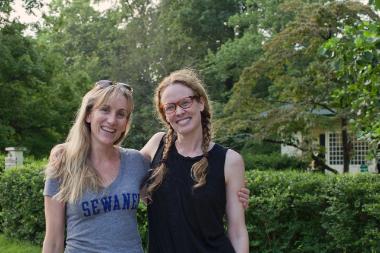
I returned to Sewanee as a Father William Ralston Fellow the summer of 2013. How could the second experience possibly match the first? Well, this time—I still get chills thinking about it—I heard Tim O’Brien’s historic reading of “How to Tell a True War Story” from The Things They Carried, a piece he hadn’t read in over a decade. It was a valiant reading. He received a minutes-long standing ovation when he finished. A few days later, another historic reading: Elizabeth Spencer, grand dame of Southern letters, read from her forthcoming collection. Let me repeat: forthcoming. Spencer is 93 years old.
I sat in workshop under the tutelage of Diane Johnson and Steve Yarbrough and had to pinch myself every time I remembered that, in addition to her many books, Johnson wrote the screenplay for The Shining. The staff readings were unsurpassed—Daniel Groves and Caki Wilkinson made us laugh, Emilia Phillips made us cry. I got to meet Roger Hodge, editor of The Oxford American, a magazine I’ve been writing for since 2009. And I met other writers who have become lifelong friends, folks who take their work seriously but still know how to have fun: Teddy Wayne, Ramona Ausubel, Andrew Malan Milward, and Louise Munson. Novelist Elliott Holt and I had adjoining rooms, and we became fast friends. One day, walking out to the Cross, she told me—through tears—a funny, deeply moving story about the day her mother died. “You’ve got to write that story,” I said.
“I don’t know,” she said. “It’s really personal.” Two months later she did write the story. The New York Times Magazine published it. An embarrassment of riches, this Conference. I’m jealous of myself just writing about it.
Caitlin Horrocks
2012 Walter E. Dakin Fellow
As I first arrived at Sewanee and found my dorm room, I realized that I was two doors down from a roommate I’d lived with eight years earlier in Arizona. I was sharing a bathroom with someone I’d met four years ago in Vermont. Another doorway was a writer I’d exchanged fan emails with about each other’s stories. We’d recognized each other at the airport in Nashville, and jabbered the entire bus trip to Sewanee. There were rounds of hugs at dinner with people I’d met when I first came to the Conference two years before. Names that I’d encountered in literary magazines or anthologies or mastheads became real people, then became fast friends. I met wonderful strangers whose names and work were new to me, and whom I’m grateful to have discovered. The entire Conference felt like a reunion, of both old friends and new: some strange, lucky episode of This is Your [Writer’s] Life.
I had so many wonderful conversations that I was hoarse midway through the Conference, careful to save my voice for my workshop with Margot Livesey and Randall Kenan, and the savviest group of writers and readers I’ve had the pleasure of workshopping with. The quality of the discussion was incredibly high, as was the level of the morning lectures and afternoon and evening readings.
I especially loved gathering to cheer on my fellow Fellows, who were celebrating the release of their very first books, and giving joint readings in which fiction, poetry, and playwriting all came into conversation with each other. I staggered away from the Conference bookstore with armfuls of new books I couldn’t wait to read, cramming them into my suitcase heedless of overweight baggage fees.
And before or after nearly every reading were those ubiquitous trays of cookies and glasses of wine, reminding us that we were in a place where the morning coffee and the evening cooking were all taken care of, freeing us to listen to stories and poems, to talk books and authors, or even head off to a swimming hole or forest trail for a brief recharging. To step outside the solitary act of writing, and join a community of writers and friends. My own writing community grew immensely at Sewanee: I met so many people that I hope (plan) to run into someday in other dorms, other mountaintops, other readings.
Greg Brownderville
2012 Walter E. Dakin Fellow
On the final Sunday morning of the 2012 Sewanee Writers’ Conference, as I told my delightful new friends goodbye, I realized how close we had become and how impossibly rich the last several days had been. At Sewanee, time seems to overflow its banks and spread out like a bayou, resisting measurement by luxuriant abundance. How could so much experience be contained in less than a couple of weeks?
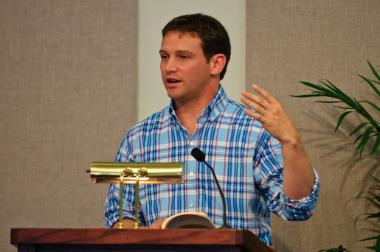
Part of the answer is that my new friends and I had made the most of our time together, staying up late and rising early, hiking, swimming, playing music, talking, laughing. Also, there was one excellent faculty reading after another. Randall Kenan, for example, received a standing ovation for his powerful fiction reading, and Maurice Manning, new to Sewanee, gave a memorable and moving performance of his poetry. I learned a lot from the formal craft lectures, as well as from informal conversations that arose spontaneously around the dinner table, on a porch at night, along the campus sidewalks. When Andrew Hudgins, Margot Livesey, Mary Jo Salter, Adam Vines, and so many other fiercely intelligent writers gather in that leisurely setting, the conversation is bound to be extraordinary.
The fellows’ and scholars’ readings impressed me, as did the fact that faculty members attended them. And I enjoyed my workshop tremendously. Dave Smith and Sidney Wade offered brilliant instruction, and the students were candid, courteous, and insightful. Wyatt Prunty and his accomplished staff, it must be said, have gotten hospitality down to an art. Spending time with them was one of the greatest joys of my Sewanee experience.
That final Sunday morning, I saw my friends off, and with their ebullient laughter and witty conversation still alive in my mind, I walked alone to a small church on campus called the Chapel of the Apostles. Finding an unlocked door, I let myself in and lingered awhile to absorb the numinous quiet of that space. In order to feel a full goodbye, I needed both the laughter and the chapel; Sewanee is the best of revelry and the best of contemplation.
Claire Vaye Watkins
2012 Walter E. Dakin Fellow
I was able to attend the 2012 Sewanee Writers’ Conference as a Walter E. Dakin Fellow. My time up on the Cumberland Plateau offered no small amount of artistic nourishment. There was Margot Livesey’s harrowing heroine, Erin McGraw’s ever-acrobatic wit. Christine Schutt broke our hearts. Jill McCorkle put them together again. Kevin Wilson delighted and afflicted us as only he can. Andrew Hudgins, that brilliant imp, set us howling and squirming with a tremendous new memoir, and Maurice Manning made us homesick for his Kentucky.
But Sewanee is more than a showcase for the stunning work of its giants. What really followed me home were the people in the audience with me. I know of few other venues where you are so likely to plop down next to someone in the exact same stage of his or her career as you. Whether you’re just starting to send your work into the world or you don’t even brace yourself before opening the mailbox anymore, whether you’re wondering if you should go to an MFA program or wondering what you’ll do with yourself now that you’ve finished one, whether you’ve been writing forever or you’ve always wanted to write, it’s such comfort to connect with other writers. I know of few other gatherings where I feel less alien, less an esoteric weirdo, less an indulgent hermit. Ours is a famously isolating calling, and Sewanee offers salve to that. There you’re with your own, people observant and offbeat, neurotic, dreamy, and brave. There you share meals and readings and lectures and walks in the woods and coffeeshop chats and cocktail hours and late-night jam sessions with your kin, reinforced not just by their work, but by their company.
Among the folks at Sewanee I’ve found some of my dearest friends. I often think of late hours spent with writers I now adore – watching the fearless whitetail deer saunter through campus with Jim Gavin and Samuel Park. Talking Faulkner in a truck bed with Hastings Hensel and Jonathan Bohr Heinen. Celebrating my book’s publication day at a swimming hole with Emily Jeanne Miller and a bottle of champagne. I’m wildly grateful for the place that brought us all together.





